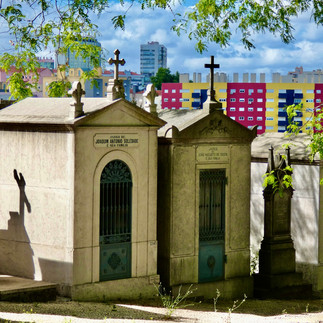Cemitério do Alto de São João, Lisbon, Portugal
- Jan Dehn

- May 7, 2023
- 3 min read
Updated: Apr 27, 2025

Built out of necessity following an 1833 cholera epidemic, Alto de Sao Joao is the largest cemetery in Lisbon. It does not feature on many check-lists of Lisbon's tourist attractions, which is a shame, or not, depending on your point of view. Alto de Sao Joao is located up the hill from the port area east of Barrio Alto, in the heart of the mainly working class Penha de França quarter. Sandwiched between Santa Cruz to the west and Madre Deus to the east, Alto de Sao Joao looks down towards the wide River Tejo, gliding past like time itself.

The graves in Alto de Sao Joao speak volumes about Portugal’s history over the past couple of hundred years. Many of the beautiful mausoleums that border the tree-lined paths within the cemetery are slowly falling apart; broken windows and unhinged doors reveal cracked caskets and tiny, dusty coffins. Each tell a tale of decline and the depth of poverty in Portugal's not-so-distant past.


In the north-western corner of Alto de Sao Joao, a bombastic World War I memorial is surrounded by crosses marking the graves of unnamed soldiers. The rocky mount with a soldier on top evokes memories of Portugal's late and reluctant entry into the War. During 1914-16, tensions with Germany over Portugal's exports to the UK steadily mounted. There were clashes between German and Portuguese troops along the Namibia-Angola border. Portugal was finally forced to abandon neutrality in early 1916. Nearly 10,000 Portuguese soldiers died in the ensuing fighting.

Alto de Sao Joao also has something to say about more recent history. Portugal's Democracy is young. The Second Republic from 1926 to 1974 was Europe's longest-lasting dictatorship. Fascist dictator António de Oliveira Salazar was zealously nationalistic, suffocatingly conservative, and deeply catholic. He subscribed to Lusotropicalism, a warped Brazilian ideology, which held that Portugal's colonies were extensions of Portugal itself and that Portugal was fundamentally a better, more human colonial power than, say, Britain or France, on account of Portugal's warmer climate and history of Moorish influence.

In reality, Portuguese colonialism was just as ghastly as that of the other colonial powers. When FRELIMO kicked Portugal out of Mozambique, the departing colonialists took everything with them, down to the electrical wiring and sockets in the walls of houses and government buildings. At independence in 1975, a mere 25% of Mozambicans had any education at all and only 40 Mozambicans were enrolled in basic university training. None had graduated yet. Like Britain and France, Portugal has never paid for its colonial crimes, but the graves in Alto de Sao Joao show that young Portuguese men did pay a heavy price for Portugal's colonial transgressions; the cemetery is dotted with their grave stones, with inscriptions about how they died in combat in far-flung places like Angola.

In the middle of Alto de Sao Joao stands a stark, modern concrete monument that commemorates the victims of the Tarrafal concentration camp in Cabo Verde. Cabo Verde was chosen as the location for the concentration camp in order to maximise the isolation of the political prisoners in an unhealthy climate with very little drinking water and malaria carrying mosquitoes during the rainy season. Portugal's aim was to isolate, mistreat, and ultimately annihilate opponents of the fascist regime and colonialism, both within Portugal and inside the colonies. To honour those who suffered and died in Tarrafal, an inscription on the monument reads:
"To those who
during the long night that was fascism
carried the flame of liberty
and for liberty died
in the concentration camp
of Tarrafal"

At a time of rising far-right extremism in prominent democracies in the West, and discussions about sending refugees to places like Rwanda, Portugal's experience with fascism offers valuable lessons. The most important is that fascists do not respect human rights, do not respect the rule of law, and do not respect Democracy. Fascists can therefore only be stopped with violence. This insight is a deeply unpleasant one for non-fascists, but it is crucial to understand, because complacency about rise of fascism today only makes the cost of defeating it tomorrow even greater. As for Portugal, it still pays the price for the decades of regressive and repressive government in the shape of the lowest literacy rate and GDP per capita in Western Europe.

Like many other great cemeteries, such as Recoleta in Buenos Aires and Père Lachaise in Paris, Alto de Sao Joao is a peaceful, beautiful, and evocative place. An elegant city of the dead. Today, Portugal is a democracy and the economy is converging with the rest of Western Europe. Fascism, Colonialism, and the turmoil of Portugal's past seem long gone, almost forgotten, like so many of the dead in their mausoleums on the hill overlooking the Tejo River. May they and Portugal's dark past rest in peace.
The End
















Comments